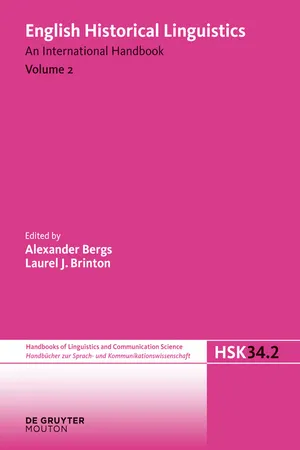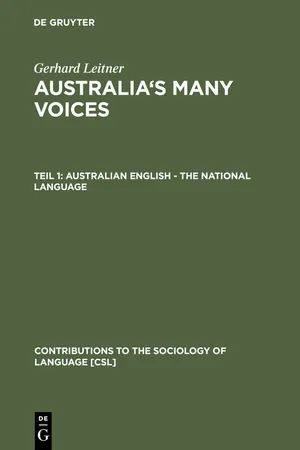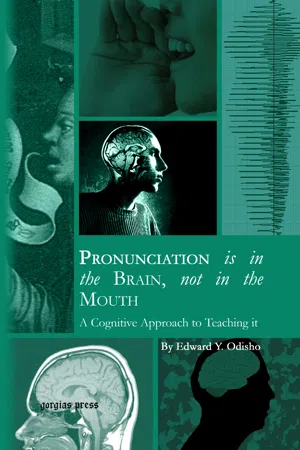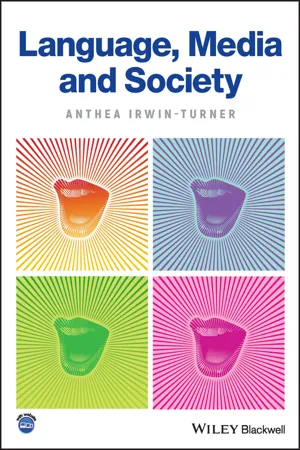Languages & Linguistics
British Accents
British accents refer to the diverse range of regional and social accents found in the United Kingdom. These accents vary in pronunciation, intonation, and vocabulary, reflecting the rich linguistic diversity across different parts of the country. From the Received Pronunciation associated with the upper class to the distinctive accents of regions like Liverpool and Newcastle, British accents play a significant role in shaping the country's linguistic landscape.
Written by Perlego with AI-assistance
Related key terms
1 of 5
7 Key excerpts on "British Accents"
- eBook - PDF
Accent and Teacher Identity in Britain
Linguistic Favouritism and Imposed Identities
- Alex Baratta(Author)
- 2018(Publication Date)
- Bloomsbury Academic(Publisher)
2 Accents in Britain and Linguistic Prejudice The standardization of language allows for only one version to be selected as the standard. This potentially leaves those who do not use the standard form in their home language, an aspect of their personal identity, feeling disenfranchised in contexts where standard English is the norm, such as schools. It is impor-tant to first distinguish dialect from accent, given the fact that standard English does exist in terms of the specific grammatical forms that are used (to include both syntax and morphology), for example, and its use of vocabulary that is understood throughout the country (e.g. Britain) and not just tied, as with non- standard grammatical forms, to a specific region or social group. In this sense, the standard form of a language, given that it is not by definition regional within the country in which it is spoken, is, of course, the ‘national’ form (e.g. standard British English). A standard dialect I begin by illustrating the syntactic and lexical realizations for language use deemed standard and those that fall outside of this category, thus, non-standard: He goes to school every day. He go to school every day. The first example is standard English grammar as it conforms to the syntax of this particular language – verbs are inflected by adding an –s for third per-son. The example that follows is from the Ebonics dialect mentioned earlier, spoken by some African Americans. In this dialect, the verb does not inflect for third person and thus no suffi x is added. Both are examples of language use which exhibit predictable rules in terms of grammar and thus both share a pre-dictable structure. There is one significant social difference between the two, 58 Accent and Teacher Identity in Britain however, and that is connected with prestige. - eBook - PDF
Language and Nationality
Social Inferences, Cultural Differences, and Linguistic Misconceptions
- Pietro Bortone(Author)
- 2021(Publication Date)
- Bloomsbury Academic(Publisher)
The use of apposite jargons too, as we shall see, can affect decisively the way in which a person is assessed and categorized. Furthermore, vastly different assumptions are made about someone depending on which language he or she speaks natively – a key issue that we will discuss when we look at the title topic of this book: the links between language and nationality. Examples: vocabulary, accent, syntax, whole languages Let us zoom in on accents, because in England they have an exceeding social significance due to their notoriously close connection to class. While the upper-class accent is, to a considerable degree, supra-regional and without much local inflection, the accents of those born and raised further down on the socioeconomic scale were, and to a significant extent are, marked by regional peculiarities. It is not an accident that accents are central to most stereotypes. The correlation between certain features Ways of Speaking 31 of British pronunciation and social class is well documented by sociolinguists, but also empirically well-known to the general public. A 1980s survey across Britain (quoted in Wells 1982: 15) asking what distinguishes upper-class people found that ‘the amount of money they have’ was only the seventh most frequent factor indicated, after what job they have, where they live, or what social circle they are in. The top answer was ‘the way they speak’! Conversely, people from the opposite end of the socioeconomic spectrum have usually been said to have an accent that marks them as low-class or ‘common’. From all this we can see that accent does not just signal class, but also constitutes it. Accent in Britain can then have further associations. Until some years ago, the accent of British politicians was enough to signal to which of the two main political parties they belonged: RP meant Conservative, and regional accents meant Labour Party. - eBook - PDF
- Alexander Bergs, Laurel J. Brinton, Alexander Bergs, Laurel J. Brinton(Authors)
- 2012(Publication Date)
- De Gruyter Mouton(Publisher)
Its role as the national language of Great Britain is not in contention, despite the counterpoint between the ideology of standard and the cultural and linguistic diver-sification of the British population in the 20th century. With its inherent pluralism, it readily absorbs linguistic elements from other varieties, yet maintains its own identity for its users at home in Great Britain and overseas. 6 References Aarts, Bas and April McMahon (eds.). 2006. Handbook of English Linguistics . Oxford: Blackwell. Aitchison, Jean. 1997. The Language Web: the Power and Problem of Words . Cambridge: Cam-bridge University Press. 1896 XIV. Varieties of English Aitchison, Jean. 2001. Language Change, Progress or Decay . 3rd edn. Cambridge: Cambridge Uni-versity Press. Algeo, John. 2006. British or American English? A Handbook of Word and Grammar Patterns . Cambridge: Cambridge University Press. Baron, Denis. 1982. Grammar and Good Taste . New Haven: Yale University Press. Biber, Douglas, Edward Finegan, and Dwight Atkinson. 1994. ARCHER and its challenges: com-piling and exploring a representative corpus of historical English registers. In: Udo Fries, Gun-nel Tottie, and Peter Schneider (eds.), Creating and Using English Language Corpora , 1–15. Amsterdam: Rodopi. Biber, Douglas, Geoffrey Leech, Stig Johansson, Susan Conrad, and Edward Finegan. 1999. Long-man Grammar of Spoken and Written English . London: Longman. Butcher, Judith. 1975. Copy-Editing . Cambridge: Cambridge University Press. Cameron, Deborah. 1995. Verbal Hygiene . London: Routledge. Clyne, Michael. 1992. Pluricentric Languages: Differing Norms in Different Nations . Berlin/New York: Mouton de Gruyter. Collins, Peter. 2009. Modals and quasi modals. In: Pam Peters, Peter Collins, and Adam Smith (eds.), Comparative Studies in Australian and New Zealand English. Grammar and Beyond , 73–88. Amsterdam/Philadelphia: John Benjamins. Coupland, Nikolas and Hywel Bishop. 2007. Ideologized values for British Accents. - eBook - PDF
- Gerhard Leitner(Author)
- 2013(Publication Date)
- De Gruyter Mouton(Publisher)
(2001: 20) There are several inferences one can make about the linguistic situation in Britain and the input into the English in Australia. The first is that London and, somewhat less, the whole of the South-East of England exerted a formative influence on all varieties of English in England (and beyond), even if regional accents had resisted, to some extent, to accommodate to London patterns. The second point is that the accents transplanted embraced the full London spectrum but included accents in the middle range of the social spectrum as well as regional dialects from around Britain. Third, even if London modes of English may have been prominent during the convict period, the whole accent spectrum continued to be transplanted and mirrored the increasing sociolinguistic stratification in London and elsewhere. While settlement was no mirror image of that in Britain, Australia had speakers from the full range of accents and may well have had a sharper accent differentiation during convictism than England. Subsequent changes in the composition of population, social stratification, economic progress, and, above all, education recast the population into a new mix. Mitchell (2001) has argued that five historical periods are relevant to the history of English: (a) The Cumberland Plain (1788-early 1820s) (b) Pastoral expansion (1820s-1850) (c) Assisted free migration (overlapping with (b)) (1830-1850) (d) The gold decade and its aftermath (1850-1870) (e) The recasting of the demographic growth from immigration to natural increase and the beginning of urbanization (1870-1900) The numerical strength of what could be called a middle class, i.e. administrators and officers, was negligible during the first phase. But as officers were paid by Treasury, he says, they were able to trade with ships that operated in the whole network of the Pacific and in the seaways to India. - eBook - PDF
Foreign Accent
The Phenomenon of Non-native Speech
- Alene Moyer(Author)
- 2013(Publication Date)
- Cambridge University Press(Publisher)
In essence, we locate ourselves and others through our ways of speaking. In this chapter we explore the idea that accent operates on an immediate level, as a communicative construct, and on a broader social level through its associations with prestige and status as well as stigma. The following questions guide the discussion: Where do we get our ideas about an accent standard given that language variation is ubiquitous? What are the communicative consequences of a foreign accent, and are these in response to social or linguistic criteria? 86 Accent and society Do stereotypes hinder our ability to ‘hear ’ non-native speakers and to interact with them successfully? In what ways can a foreign accent hinder cultural integration over the long term? As much of the relevant research focuses on English as a second language, ESL/EFL will serve as the chapter ’ s primary reference. We begin with the question: Has there ever been a single standard for pronunciation in English? 4.1 Historical perspectives on a standard accent in English Let your articulation be clear and distinct . . . Let each syllable and the letters which compose it be pronounced with a clear voice, without whining, drawling, lisping, flammering, mumbling in the throat, or speaking through the nose. Avoid equally a dull, drawling habit, and too much rapidity of pronunciation; for each of these faults destroys a distinct articulation. (Noah Webster 1789) Standardization – the codification of pronunciation, grammar, lexicon, or spelling for a given language variety – is often set in motion by political paradigm shifts such as declarations of independence, regime change, etc., or the publication of literature that leads to a canon, as with Luther’ s translation of the Bible into German and Wycliffe’ s translation of it into English (Wardhaugh 2010: 31f.). - eBook - PDF
Pronunciation is in the Brain, not in the Mouth
A Cognitive Approach to Teaching it
- Edward Y. Odisho(Author)
- 2014(Publication Date)
- Gorgias Press(Publisher)
59 C HAPTER 4: L INGUISTIC A CCENT : D EFINITION , C LASSIFICATION AND D EMONSTRATION 4.1. I NTRODUCTORY R EMARKS As mentioned earlier on with regard to the difference between dialect and accent, the former is usually used to refer to a com-bination of grammatical, lexical and pronunciation differences, whereas the latter is essentially confined to pronunciation dif-ferences. In fact, in ESL classroom situations or real-life interac-tions, one is able to identify the accent of an L2 speaker not necessarily based exclusively on pronunciation inaccuracies and deviations from acceptable targeted standard pronunciation. In many instances, there are grammatical, morphological and lexi-cal hints that trigger an accent in pronunciation. Take, for in-stance, the case of some English past tense and past participle formations of verbs which end with suffixes that are in the form of voiced or voiceless consonant clusters. Often such clusters are broken up or reduced in one way or another by Hispanic learn-ers of English because they are alien to their native phonology. For example, the past tense of is and are pronounced as ]. Traditionally, Hispanics try to overcome the problem in one of two ways both of which are, unfortunately, wrong: 1) Reduce the cluster by dropping one of its elements, usually the latter. This means that instead of pro-nouncing [ ] and [ ] correctly, they would simply reduce them to [ ] and [ ]. 2) Insert a vowel between the two el-ements of the cluster, break up the cluster and cause a reshuffle in the syllabic structure of the word. To demonstrate, instead of pronouncing the word or as [ ] and [ ], they are rendered roughly as [ ] and [ ]. Un-doubtedly, this is a grammatical problem but its roots are in pronunciation. In the totality of the performance of English, - eBook - PDF
- Anthea Irwin-Turner(Author)
- 2023(Publication Date)
- Wiley-Blackwell(Publisher)
These accents and dialects would, particularly in the past, have been more likely to be the accents and dialects of the most powerful in society in news and current affairs, or stereotyped versions of more working-class varieties in comedies and dramas. We have since moved further on to the development of the internet, which allows us to hear the varieties of lan- guage spoken by almost anyone we choose (albeit the internet is still dominated by US English), and eventually gaming and social media, whereby we can not only hear, but interact with, people speaking a whole range of different varieties. The four shifts we have just thought about bring with them massive potential for dialect levelling in the sense of different varieties integrating with and perhaps merging into one another. On the other hand, two of the points I made earlier in the chapter suggest that it is a more complex and nuanced picture. Firstly, we hear more regional variety in news media currently, though this tends to be more variety at the upper end of the social class hierarchy; this is the reason for the triangle having a broader top than before. Secondly, more people are choosing to celebrate and construct working-class identities which give non-standard varieties more (covert) prestige. This is done not just by people constructing an identity based on their working-class background; covert prestige means that middle-class people too sometimes construct themselves as more working class in order to gain more credibility in a particular context, more covert prestige, or more specific social or cultural capital that they desire to have. 9.6 Linguistic Identities While we all speak with an accent and a dialect, and those are more or less related to regions we have lived in or social class identities we have or choose to perform, we all have our individual speech style that is recognisable and is part of our identity. Each person’s speech style is a little
Index pages curate the most relevant extracts from our library of academic textbooks. They’ve been created using an in-house natural language model (NLM), each adding context and meaning to key research topics.






